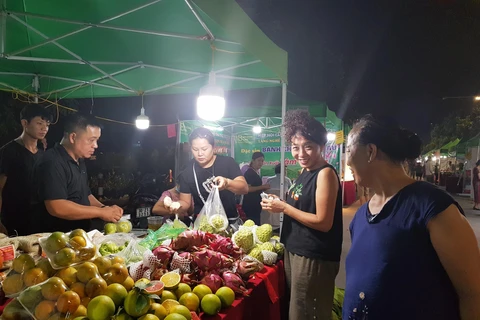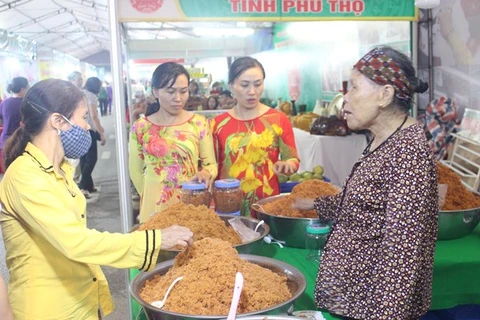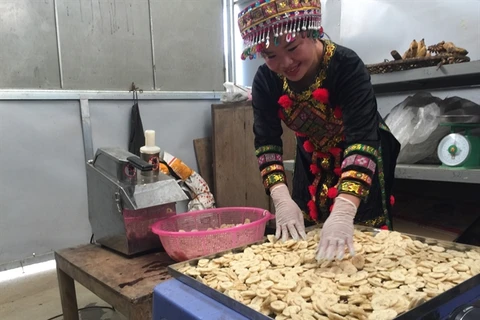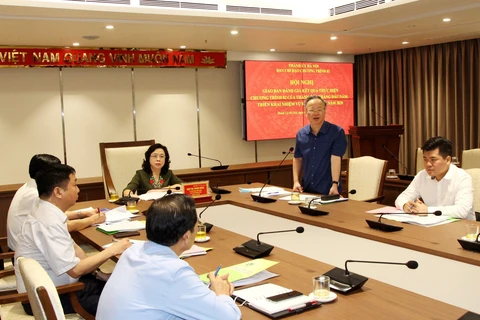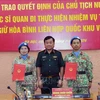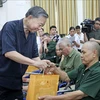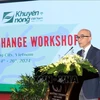Kien Giang (VNA) - The Mekong Delta province of Kien Giang will spend more than 326 billion VND (14 million USD) to implement the One Commune, One Product programme in the 2019-25 period.
Of the amount, 119 billion VND will comes from the Government and the rest from other stakeholders in the programme launched by the Ministry of Agriculture and Rural Development.
It aims to develop one staple product in each commune around the country.
Kien Giang is implementing it in 145 communes, wards and towns, with registered business households, production establishments, co-operative groups, co-operatives, and companies participating, according to its Department of Agriculture and Rural Development.
Its OCOP products are commercial products and services like food and beverages, medicinal herbs, handicrafts and home decoration, and rural tourism services and sales.
The programme ranks them on a scale of five stars, with a five-star being the highest.
The province wants to have one or two of its current OCOP products meeting provincial five-star standards this year, and by 2025 having 25 to 30 of provincial five-star standards and five of national five-star standards.
To implement the programme, the People’s Committee has ordered relevant agencies and local authorities to increase the dissemination of information about the programme in the community.
The province plans to consolidate the management of the programme and provide human resources training to implement it, step up research and use advanced techniques to produce OCOP products.
Do Thanh Binh, Deputy Chairman of the provincial People’s Committee, said the province aims to develop production in rural areas to enable industrialisation and modernisation of agriculture and rural areas.
It would enable the appropriate use of labour in rural areas, protect the environment and preserve traditional values, he said, adding it would contribute to restructuring agriculture, changing the economic structure and improving the incomes and thus lives of rural people./.
Of the amount, 119 billion VND will comes from the Government and the rest from other stakeholders in the programme launched by the Ministry of Agriculture and Rural Development.
It aims to develop one staple product in each commune around the country.
Kien Giang is implementing it in 145 communes, wards and towns, with registered business households, production establishments, co-operative groups, co-operatives, and companies participating, according to its Department of Agriculture and Rural Development.
Its OCOP products are commercial products and services like food and beverages, medicinal herbs, handicrafts and home decoration, and rural tourism services and sales.
The programme ranks them on a scale of five stars, with a five-star being the highest.
The province wants to have one or two of its current OCOP products meeting provincial five-star standards this year, and by 2025 having 25 to 30 of provincial five-star standards and five of national five-star standards.
To implement the programme, the People’s Committee has ordered relevant agencies and local authorities to increase the dissemination of information about the programme in the community.
The province plans to consolidate the management of the programme and provide human resources training to implement it, step up research and use advanced techniques to produce OCOP products.
Do Thanh Binh, Deputy Chairman of the provincial People’s Committee, said the province aims to develop production in rural areas to enable industrialisation and modernisation of agriculture and rural areas.
It would enable the appropriate use of labour in rural areas, protect the environment and preserve traditional values, he said, adding it would contribute to restructuring agriculture, changing the economic structure and improving the incomes and thus lives of rural people./.
VNA

